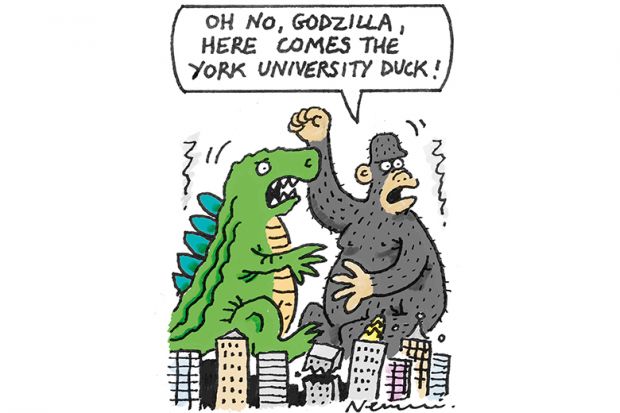
Cantankerous university lecturers used to enjoy a certain cult status, with their marvellously misanthropic rants making good fodder for common-room chat. Such characters don’t go down quite so well in the brave new world of (recorded) Zoom seminars, as one University College Dublin (UCD) sociologist found out. According to the Irish Times, Paul Stokes “delivered a tirade of criticism against his students during a recent lecture” after some of them had complained to university authorities about his teaching. “I’m embarrassed for your generation,” said Dr Stokes of the “three, four tribunals of inquiry” to deal with the matter. “UCD is a joke, it’s a joke university,” he added. In other Zoom classes, the lecturer took aim at his students, branding them a “disgrace”, adding: “I don’t know how you ever got into UCD but we all know that, you know, you can’t read or write.” The university declined to comment on the matter, though Dr Stokes was unsurprisingly more forthright. “This is not journalism – it is an assassination most foul,” he told the paper.
A different kind of fowl was attracting attention in the north of England after a metre-tall duck beloved by students caught the attention of a famous author’s literary estate. Dick King-Smith’s fantastical stories about sheep pigs and other quirky farmyard animals captured the imagination of millions but his website seemed to find inspiration in the form of Long Boi, resident at the University of York. In a Reddit post that gained more than 9,000 retweets, the author’s website claimed Long Boi was the “tallest mallard duck to have ever lived”, at more than a metre in height, the i newspaper reported. In fact, York’s giant fowl is only 70cm when standing tall – fairly typical for the Indian runner species. Nevertheless, the university was quick to embrace the online buzz around Long Boi, whose student-created Twitter account boasts 15,000 followers. “We are proud of our wildfowl and this very striking duck is no exception,” the university said.
The Covid-enforced relocation of Oxford and Cambridge’s rowing crews away from the River Thames this year has led one vice-chancellor to suggest a far more radical shake-up to the boat race. In future, the hallowed annual Oxbridge event should become a “three-way competition” involving the University of St Andrews’ highly capable oarsmen and women, said Sally Mapstone after the ancient Scottish university pushed Cambridge into third in an academic league table. The idea was, of course, a joke and “Professor Mapstone’s tongue was firmly in her cheek”, a university spokesman clarified to The Times. “We’re immensely proud of our boat club and maybe one day we’ll match Oxbridge stroke for stroke on the water, perhaps in a rowing super league, but for now our focus is to continue to stretch them in world-leading research, teaching and student experience,” he added.
A US university has asked the FBI to investigate whether Rwandan officials spied on a Zoom conference held in support of a high-profile dissident, Inside Higher Ed has reported. Staff at St Mary’s University in Texas had organised an online event to discuss the campaign to free Paul Rusesabagina, whose heroism in saving more than 1,000 people during the 1994 genocide was dramatised in the film Hotel Rwanda. But the talk was apparently gatecrashed by an unknown individual who refused to identify himself and whose IP address was matched to a staffer at Rwanda’s embassy in Washington. “To think that they would dedicate the two hours to listen to what I had to say and to what the students had to say to help us, I just found it very scary,” said Mr Rusesabagina’s daughter Anaïse Kanimba.
It’s 60 years since man was first blasted into orbit, but space remains the final frontier for one group: humanities graduates. That may soon change, after Japan said it was dropping the requirement for its astronauts to have a degree in natural sciences. Instead, its space agency will allow those with a humanities degree to join a lunar exploration programme being led by Nasa. “What’s important is whether applicants have the necessary disposition for the mission,” said astronaut Koichi Wakata, who noted that airline pilots were recruited from liberal arts backgrounds, the Japan Times reported. Successful applicants will still be required to carry out complex scientific tasks if they make it on to the Moon, where they will be asked to build a human-crewed space station, suggesting that any gifted artists, authors or deep thinkers might have to wait a while before deploying their creative faculties in space.
Register to continue
Why register?
- Registration is free and only takes a moment
- Once registered, you can read 3 articles a month
- Sign up for our newsletter
Subscribe
Or subscribe for unlimited access to:
- Unlimited access to news, views, insights & reviews
- Digital editions
- Digital access to THE’s university and college rankings analysis
Already registered or a current subscriber? Login



